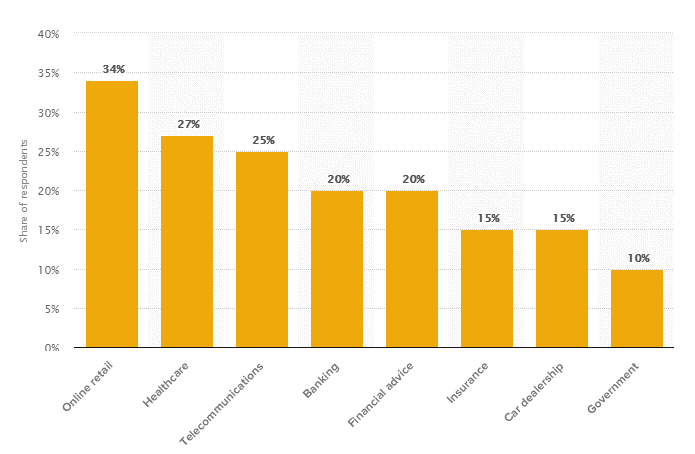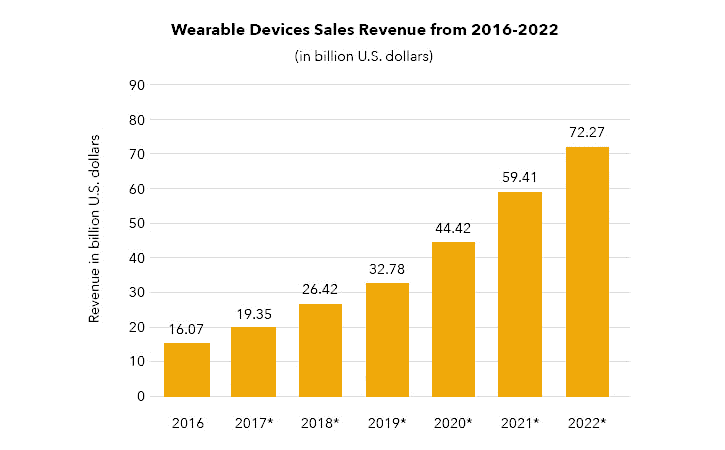The tech world has been evolving rapidly since over a decade now. People want information and services at their fingertips, and mobile app technology is constantly catering to their demands. Mobile app development has witnessed just over 28 billion downloads, which is a year-over-year increase of 11.5 percent in 2019.
Reference Source: https://demo.sensortower.com/sensor-tower-q2-2019-data-digest?src=blo
Reference Source: https://www.statista.com/statistics/269025/worldwide-mobile-app-revenue-forecast/
Trends in 2018 till mid-2019
Experts in this field believe that mobile app industry will rapidly grow because the end user is always demanding more “convenient services”. Let’s take a look at the top mobile app trends that have rocked the market in 2018-2019.
- Augmented Reality
- Virtual Reality
- Artificial Intelligence
- Cloud-Oriented Mobile Apps
- Blockchain
- Personalization
- Android Instant App
- On-Demand Apps
- Accelerated Apps
- Mobile Payments
- Application Security
- Internet of Things
Although the above trends have dominated the market, there are a lot of improvements and added features and functionalities that can be enhanced. Let’s take a look at the predicted 5-top priority mobile app development trends for the year 2020.
5-Top Priority Mobile App Development Trends
1. 5G Networks
4G network is soon going to be replaced with 5G which means that the user can download content faster – if it takes them 5-10 minutes to download data on 4G, 5G will allow them to download the same data in seconds, even if the app is bulky. Motorola Product Vice President, Dan Dery, says in an interview with Digital Trends that “5G will deliver lower latency, higher bandwidth, faster data sharing, and speeds up to 10 times faster than existing wireless technology.”
Reference Source: https://www.digitaltrends.com/mobile/2025-how-5g-changed-our-lives/
A group of the business pioneers are excited to introduce 5G in their smartphones. For instance, Samsung and Verizon plan to dispatch gadgets with 5G-skilled chips in 2019. LG wants to join the pattern as well and even beat the contenders toward the start of 2019. Once the technology is fully released, smartphone users will have access to noticeably increased connectivity speeds of roughly 10 gigabits per second.
The benefits of 5G will also include:
- Shortened transmission latency for private companies (i.e. it can create immediate connectivity between devices on a network)
- Prioritize specific data transmissions over others
- Provide multiple opportunities for innovation
- Automate core processes and deliver improved mobility tools for presenting, capturing, and sharing essential data
- Create business processes where the physical and digital are efficiently interconnected, in real-time
2. Artificial Intelligence (AI), Machine Learning (ML) and Chatbots
Artificial Intelligence (AI) is definitely the next big thing in the tech market. It already has its jaws firmly placed in the industry but there is a huge scope to innovate. Developing machines to human tasks is not new – we all know about Siri, Google Assistant and Cortana. AI helps us in almost everything like listening to playlists, managing schedules, ordering food, etc. If you get lost on a road, Google Maps will help you steer in the right direction giving you the best route option.
Machine Learning (ML), a hand-in-hand technology with AI, makes mobile apps smarter than humans by allowing the app to make a decision on behalf of the user as per their preferences. ML is being used almost everywhere like to predict the traffic, online product recommendations, fraud detection, etc.
Chatbots, which is a mix of AI and ML, is the perfect example of the magic capable in the tech world. Chatbots are being highly used in the banking sector, online stores, travel portals, Government institutes for providing seamless customer service. For instance, most travel companies can help you with your booking with the help of chatbots. Let’s take a look at the acceptance of AI-powered Chatbots by customers worldwide in 2017.
Mobile deep linking is not a new trend in the market – personalized site-to-app, app-to-app, and even things-to-app experience is going to be upcoming mobile app trend in 2020. Ambient interfaces, sometimes referred to as “zero-UIs” are allowing people to interact with technology more freely and with fewer direct actions. For instance, digital assistants and voice technology delivers information in real-time.
Digital assistants connected to the user’s home appliances, smartphones, smart cars, wearable devices, etc. will listen and observe in the backgrounds of their lives and collect information. Hence, when the user needs assistance they will use this information in their ‘search’. These technological advancements will require more personalized and relevant deep linking practices.
For example, if the user has been looking at Maldives as a vacation destination since a past few days, he/she will be intimidated of flight offers, hotel offers, news about Maldives, pop-ups in case of a bad weather forecast, etc. The search engine will also advertise options of other beach destinations which are cheaper or luxurious depending on the data gathered from the user and from the other apps on the appliance.
By using user’s information, it will be easier for a business to understand the situations users want information from you and how and take users from site-to-app, app-to-site, or app-to-app will entirely depend on the user’s search behaviour and context.
4. Moment Marketing
In 2015, Google coined a movement called ‘micro-moments’ and right-time marketing, which focusses on harnessing a real-world consumer intent, with mobile as a natural gateway; for example, choosing the right context to interact with users, sending place-based coupon redemptions and dynamic offers to increase engagement, reduce UX friction and jump sales uplift.
Personalizing a mobile app has been the key experience for app companies. But in 2020, there will be an increase in its level of depth and one-to-one precision when it comes to understanding and mirroring app users.
According to Plot Projects, building user-profiles and surfacing content just based on online or in-app behaviour is no longer enough to engage users and keep them around. In fact, in the year 2018, the open-rate of messages which are sent based on where someone is (and what they’re doing) generated twice the engagement of personalized messages.
Reference source: https://www.plotprojects.com/
For example, many companies spend money to boost their app downloads, not realising that about three fourth users never return to the app after their first visit. Moment marketing helps businesses by generating marketing campaigns to remind the users about the app or offer them discounts or new services. “Engagement platforms help brands increase their share of highly engaged customers by 37 percent and the number of users who make in-app purchases in the first 30 days alone by five times.”
Reference Source: https://www.leanplum.com/
5. Wearables
As per Statista, the Wearables devices sales revenue is expected to reach around $33 Billion by the beginning of 2020.
Reference Source: https://www.statista.com/statistics/610447/wearable-device-revenue-worldwide/
For example, Apple Watch connected with an iPhone can monitor your health-related issues, manage business transactions, help in communicating, listening to music, sending notification on Smartphones about your BP level, paying for a transaction through Apple Pay, or sending an important voice message. Further, companies like Zomato and Uber are also investing in wearable app development so that they don’t miss out in targeting the increasing wearable users these days.
Summarizing Possibilities of Mobile App Trends in 2020
Mobile users are looking for speed, features and high-end security for their data. They are demanding apps that make it easier for the user to shop, book tickets, taxi, and saving money. Although the patterns never stay steady and keep changing as per the user’s demands and other variants there are a few trends that can be predicted to cause a stir in the tech marketing in 2020.
Users want access to hyper-personalized, real-time, contextual content seamlessly connected across each of their device and new and creative ways to create and share experiences with their mobile devices.
If you wish to know more about mobile app development trends in 2020, you can contact the App Scoop mobile app developers or the Vancouver app development team on: https://app-scoop.com/contact-us.html





